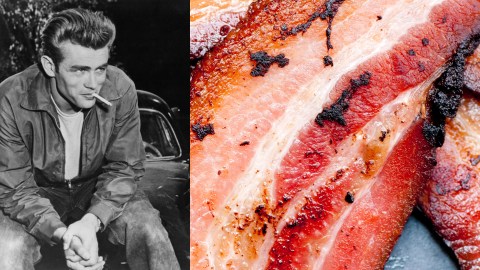Bacon Is 139x Less Likely to Cause Cancer than Smoking

Earlier this week reports came out that bacon causes cancer. The sentence on its own is enough to make any processed-pork enthusiast weep, but it’s not the full story.
We all heard that the World Health Organization (WHO) classified bacon (and processed meats) as a Group 1 carcinogen, the same category as cigarettes, and asbestos. You know what other things have received this group 1 classification? The sun and alcohol. However, each of these products have their own assessed risk, which is not related to the classification.
[F]or every 1.8-ounce portion of processed meat a person consumes a day, their risk of getting bowel cancer increases by 18 percent. … Smoking, on the other hand, increases your risk of contracting lung cancer by 2,500 percent.
The WHO writes that it gives out the Group 1 classification when “there is convincing evidence that the agent causes cancer.” But, the organization writes, “This does NOT mean that they are all equally dangerous. The IARC [International Agency for Research on Cancer] classifications describe the strength of the scientific evidence about an agent being a cause of cancer, rather than assessing the level of risk.”
The report breaks down that for every 1.8-ounce portion of processed meat a person consumes a day, their risk of getting bowel cancer increases by 18 percent. These chances are low in the larger scheme of things. Smoking, on the other hand, increases your risk of contracting lung cancer by 2,500 percent. So, the key here (for bacon) is moderation.
“For an individual, the risk of developing colorectal cancer because of their consumption of processed meat remains small, but this risk increases with the amount of meat consumed,” Dr. Kurt Straif, head of the IARC Monographs program, said in an interview with The Guardian.
A little bacon on your egg and cheese sandwich or on the side for breakfast won’t hurt.
Dan Buettner, author of The Blue Zones Solution, has traveled the world studying regions where the local population enjoys exceptionally long average lifespans. Most of them don’t eat bacon…
***
Natalie has been writing professionally for about 6 years. After graduating from Ithaca College with a degree in Feature Writing, she snagged a job at PCMag.com where she had the opportunity to review all the latest consumer gadgets. Since then she has become a writer for hire, freelancing for various websites. In her spare time, you may find her riding her motorcycle, reading YA novels, hiking, or playing video games. Follow her on Twitter: @nat_schumaker
Photo Credit: Tim Graham / Stringer/ Getty





